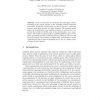Free Online Productivity Tools
i2Speak
i2Symbol
i2OCR
iTex2Img
iWeb2Print
iWeb2Shot
i2Type
iPdf2Split
iPdf2Merge
i2Bopomofo
i2Arabic
i2Style
i2Image
i2PDF
iLatex2Rtf
Sci2ools
111
click to vote
DALT
2006
Springer
2006
Springer
Agreeing on Defeasible Commitments
Social commitments are developed for multi-agent systems according to the current practice in law regarding contract formation and breach. Deafeasible commitments are used to provide a useful link between multi-agent systems and legal doctrines. The proposed model makes the commitments more expressive relative to contract law, improving the model for the life cycle of the commitments. As a consequence, the broader semantics helps in modelling different types of contracts: gratuitous promises, unilateral contracts, bilateral contracts, and forward contracts. The semantics of higher-order commitments is useful in deciding whether to sign an agreement or not, due to a larger variety of protocols and contracts.
Related Content
| Added | 22 Aug 2010 |
| Updated | 22 Aug 2010 |
| Type | Conference |
| Year | 2006 |
| Where | DALT |
| Authors | Ioan Alfred Letia, Adrian Groza |
Comments (0)

